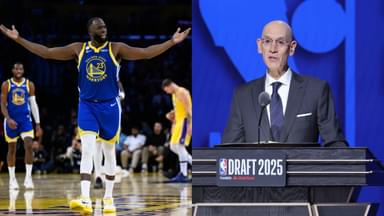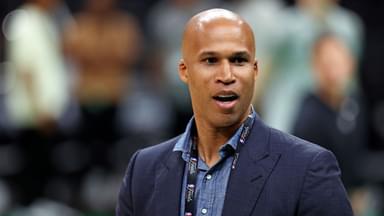The NBA was rocked last week by a series of FBI arrests stemming from illegal gambling. One of the players caught up in the sting was Miami Heat guard Terry Rozier, who is accused of purposely taking himself out of games so that his under prop bets would hit, enriching himself and his co-conspirators.
Advertisement
This isn’t the first time an NBA player has allegedly done something like this. Jontay Porter was banned from the league for life last year after he was found to have bet on games and manipulated outcomes. He also pleaded guilty to a federal felony charge of conspiracy to commit wire fraud.
Rozier has been hit with the same charge, as well as one count of conspiracy to commit money laundering. He was cleared by the NBA in January after being investigated due to suspicious gambling activity, a fact which has caused the United States Senate to write a letter to the league requesting more information about that investigation.
On The Hoop Collective podcast this morning, ESPN’s Brian Windhorst and Tim Bontemps welcomed Katherine Reilly, a lawyer and former chief of the SDNY Complex Frauds and Cybercrime unit. Reilly discussed Rozier’s case, and why she believes that the charges against him may ultimately be dropped.
“I would draw a distinction between the factual evidence and the legal issues,” she said. “My guess is the factual evidence is strong in both cases … My guess is that on the facts, they have witnesses and evidence that are strong on both cases.”
“I think the bigger issue is the legal question,” she continued. Reilly said that she sees the illegal and rigged poker games that Chauncey Billups is accused of taking part in as being pretty standard fare along legal lines, but that the government may have problems in prosecuting the wire fraud cases.
“The wire fraud indictment, the sports betting indictment, I do think has some legal risk,” she said, before explaining what she meant by that. “What I mean essentially is that the case could get thrown out, because even if you believe the facts the government is alleging, or eventually whenever they prove up whatever facts there are, it’s not a crime.”
What Reilly is saying is that even if the government can prove these activities occurred, it may not be open and shut that a crime was actually committed. She cited New York, where the case will be tried, as a place that has ruled in recent years “that prosecutors are pushing this too far,” causing their cases to get thrown out.
Reilly believes that bettors may not legally be bound to disclose where they got their information from, which would mean that they couldn’t have committed wire fraud. So even if the Terms and Services on certain betting websites prohibit the use of inside information, that wouldn’t constitute grounds for federal prosecution.
The FBI is treating this case as a huge win, so Rozier is going to need the best representation he can find to fight these charges. If what he’s alleged to have done is true, then his basketball career is certainly over, but it seems there’s a chance that he can avoid jail time if things go his way.








